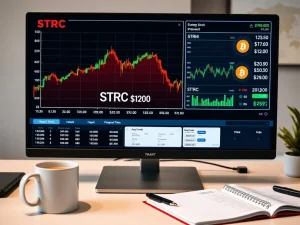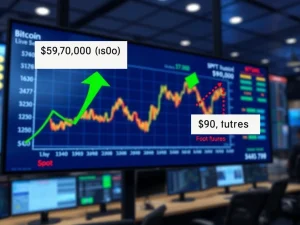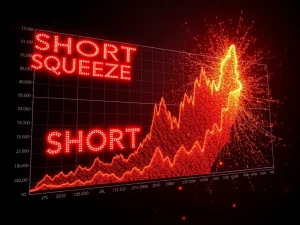Crucial Bond Market Clash: Trump Fought, Saifedean Ammous Says Bitcoin Shines

Recent financial events, particularly surrounding US trade policy, have once again sparked debate about the stability of traditional markets and the potential role of cryptocurrencies like Bitcoin. Economist Saifedean Ammous offers a pointed analysis, suggesting a significant development occurred when former President Donald Trump adjusted his tariff strategy.
Saifedean Ammous on Trump Tariffs and Market Reactions
According to Saifedean Ammous, author of ‘The Bitcoin Standard,’ a recent decision by the Trump administration to pause higher reciprocal tariffs was a direct response to pressure from the financial markets. Ammous commented on April 23 via X, stating, “Trump fought the bond market and the bond market won.”
This assertion stems from the market reaction following Trump’s tariff announcement. Initially, there seemed to be an expectation that crashing the stock market via tariffs might somehow benefit the bond market, perhaps by signaling a need for safer assets. However, the outcome was different.
The Bond Market Responds: Yields Spike
Following the tariff announcement, CNBC data indicated a notable surge in the 10-year Treasury yield. It jumped from below 4% to 4.5%. This rise in yields signals a sell-off in bonds, driven by investor concerns about inflation and recession risks heightened by the trade uncertainty.
Ammous pointed out that this increase in yields was the opposite of what the administration likely intended. He described the reversal on tariffs, happening just half a day after they were set to take effect, as damaging to Trump’s negotiating stance.
Trade War Dynamics and Global Stability
Some analysts, like Raoul Pal, have speculated that the tariff maneuvers might be strategic posturing aimed at reaching a trade agreement with China. However, Ammous views the swift reversal as evidence that such tactics were ineffective.
“All of the talk about China buckling under the threat of Trump now sounds hilarious in retrospect, when Trump could not keep his tariffs in place for two days,” Ammous remarked. He added that China showed no apparent urgency to negotiate a deal.
Delays in resolving trade tensions could impact the recovery of both traditional equity markets and cryptocurrency markets, as they often react to global economic and political developments.
Is Bitcoin a Safe Haven?
Amid this financial volatility and trade uncertainty, the discussion about Bitcoin‘s role as a safe haven asset has resurfaced. Some observers note that Bitcoin’s behavior during these periods appears less correlated with traditional tech stocks and more aligned with assets sought during economic instability.
Iliya Kalchev, an analyst at Nexo, suggested that Bitcoin is acting “less like a tech stock and more like a hedge against economic uncertainty” following signals of potential tariff reductions on Chinese goods.
The Case for a Bitcoin Standard
The situation has also reignited discussions about radical monetary reforms, specifically the idea of a Bitcoin Standard. Saifedean Ammous is a prominent proponent of this concept.
He proposes a strategy where the US government would continuously acquire Bitcoin until its holdings are sufficient to back the entire US dollar supply. At that point, the nation would transition to a Bitcoin standard, allowing dollars to be redeemable for Bitcoin. Under this system, the government would be limited to spending only what it earns.
Historically, the US dollar was backed by gold until 1971. Proponents of a Bitcoin standard argue that Bitcoin’s fixed supply, enforced by its protocol, offers a similar, albeit digital, form of scarcity and reliability that fiat currencies lack.
Looking Ahead: Bitcoin vs. Gold
The fixed supply of Bitcoin makes it a compelling digital alternative to gold, which has historically served as a store of value during economic turmoil. Joe Burnett, director of market research at Unchained, has even predicted that Bitcoin could rival or surpass gold’s market capitalization within the next decade, potentially reaching a price exceeding $1.8 million by 2035.
Events like the reaction of the Bond Market to Trump Tariffs continue to highlight the vulnerabilities in the existing financial system and underscore the arguments made by figures like Saifedean Ammous regarding the potential need for alternative assets and monetary systems like the Bitcoin Standard.
Summary
Saifedean Ammous views the recent adjustment in Trump’s tariff policy as a capitulation to the bond market’s reaction, where rising yields signaled investor concern. This episode highlights the sensitivity of traditional finance to political decisions and reignites the debate around Bitcoin’s role as a potential hedge against such instability and the long-term viability of a Bitcoin standard.








